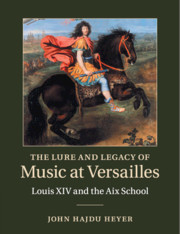Description
The Lure and Legacy of Music at Versailles
Louis XIV and the Aix School
Author: Heyer John Hajdu
Taking its departure from King Louis XIV's 1660 visit to Provence, this book reveals the remarkable musical developments that followed.
Language: EnglishApproximative price 34.17 €
In Print (Delivery period: 14 days).
Add to cart
The Lure and Legacy of Music at Versailles
Publication date: 01-2019
Support: Print on demand
Publication date: 01-2019
Support: Print on demand
Approximative price 80.21 €
In Print (Delivery period: 14 days).
Add to cart
The Lure and Legacy of Music at Versailles
Publication date: 11-2014
299 p. · 18.2x25.4 cm · Hardback
Publication date: 11-2014
299 p. · 18.2x25.4 cm · Hardback
Description
/li>Contents
/li>Biography
/li>
Louis XIV and his court at Versailles had a profound influence on music in France and throughout Europe. In 1660 Louis visited Aix-en-Provence, a trip that resulted in political and cultural transformations throughout the region. Soon thereafter Aix became an important center of sacred music composition, eventually rivaling Paris for the quality of the composers it produced. John Hajdu Heyer documents the young king's visit and examines how he and his court deployed sacred music to enhance the royal image and secure the loyalty of the populace. Exploring the circle of composers at Aix, Heyer provides the most up-to-date and complete biographies in English of nine key figures, including Guillaume Poitevin, André Campra, Jean Gilles, François Estienne, and Antoine Blanchard. The book goes on to reveal how the history of political power in the region was reflected through church music, and how musicians were affected by contemporary events.
Foreword Lionel Sawkins; Prologue; General introduction; Part I. Rendezvous in Provence: 1. The winter of 1660: Louis XIV and the royal court visit Provence; 2. A choirboy and his king: the early life of Guillaume Poitevin; Part II. The Aix School: A Legacy of Maîtres: 3. Guillaume Poitevin: maître of Saint-Sauveur; 4. André Campra: an extraordinary career; 5. Jean Gilles: an independent spirit; 6. The 'petits maîtres'; 7. Antoine Blanchard: the eighteenth-century master; Part III. The Lure and Legacy: 8. The lure of music at Versailles and the Île-de-France; 9. Patronage and the Provençal networks; 10. The legacy of the Aix School; Conclusion; Epilogue; Appendix I; Appendix II.
John Hajdu Heyer is Professor Emeritus at the University of Wisconsin, Whitewater. He began his exploration of French sacred music from the time of Louis XIV during his years as a student in Paris with Nadia Boulanger (1967–70). His publications include two books and five critical editions of works by Jean-Baptiste Lully and Jean Gilles. His work as a musicologist and conductor has twice been recognized with the Noah Greenberg Award from the American Musicological Society for 'distinguished contribution to the study and performance of early music'. He has served on the Council of the American Musicological Society, the editorial board for the Web Library of Seventeenth-Century Music, and was active on the committees preparing the collected works of Lully. In the past four years, he has undertaken extensive research in the archives and libraries of southern France.
© 2024 LAVOISIER S.A.S.





